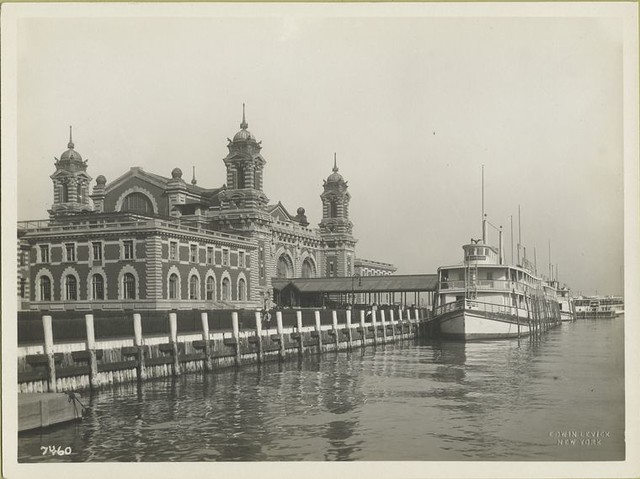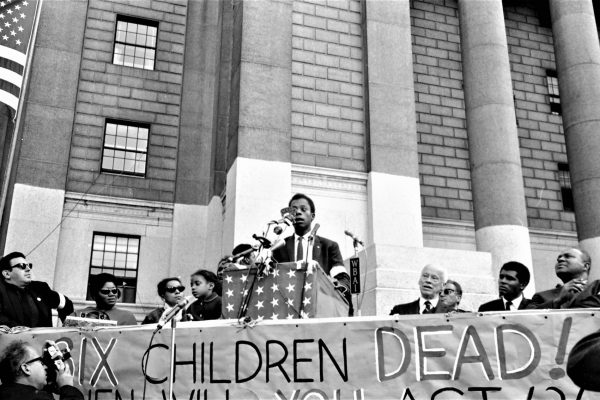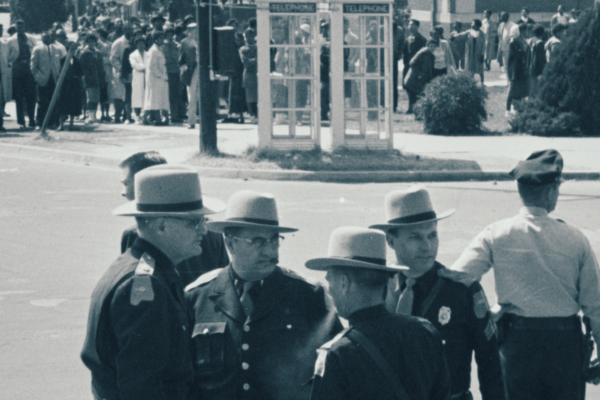Who Are We? The Challenges to America’s National Identity
Samuel Huntington
Simon and Schuster, $27 (cloth)
Have you ever felt bewildered by the question of American identity? Samuel Huntington is here to help. According to Huntington, American identity is neither racial nor ethnic. Nor is it based merely on adhering to a set of laws or democratic principles. If you think that you are American just because you have a U.S. passport, you’re wrong. American identity is defined by culture, and, Huntington explains, Americans are culturally Anglo-Protestants. If you feel American, odds are that you’re culturally Anglo-Protestant. Under certain circumstances, this principle may even apply to black Muslims.
Some Anglo-Protestants have a vain conceit. They like to think that they are more Anglo-Protestant than others. Butthey’re wrong about that. Indeed, the main features of Anglo-Protestant culture are shared by most of us, and they are, according to Huntington, “the English language; Christianity; religious commitment; English concepts of the rule of law, the responsibility of rulers, and the rights of individuals; and dissenting Protestant values of individualism, the work ethic, and the belief that humans have the ability and the duty to try to create a heaven on earth, a ‘city on a hill.’”
Black folks shouldn’t confuse culture with racial background either. They may look black, but culturally they are Anglo-Protestants. African-Americans are about as committed to English concepts of therights of individuals, the rule of law, and the work ethic as the rest of us. Take Colin Powell, for instance. “When people look atColin Powell, they may see a black, but they also see a secretary of state, a retired four-star general, the leader of America’smilitary in a short, victorious war, and, if they are internationally oriented, the principal proponent in the Bush administration of multilateralism in American foreign policy.” He’s Anglo-Protestant all right.
This definition of American national identity is so obvious it wouldn’t bear repeating, if it weren’t for some recent confusion. According to Huntington, American identity was doing just fine until the 1960s, when a bunch of petty subnational identities and sinister and disloyal transnational identities started to bring American identity down. “The Stars and Stripes were at half-mast and other flags flew higher on the flagpole of American identities.” Since then things have gotten even worse.
The end of the Cold War left the United States without a common enemy. Its elites have become liberal multicultural cosmopolitans. “Overall,” Samuel Huntington tells us, “American elites are not only less nationalistic but are also more liberal than the American public.” Indeed, only 22 percent of the American public self-identifies as liberal, whereas a whopping 91 percent of leaders of public-interest groups are liberals. True, Huntington’s statistics also show that only 14 percent of American business elites and nine percent of the military elites are liberals, but let’s not split hairs: if you add them all up, “elites” are liberal.
And there is an even more urgent cause for alarm, a more pressing challenge to America’s national identity: the current “Hispanic” invasion.
Many people think that they don’t need to be told what the problem with Hispanics is (they’ve already met them!). But whatever their prejudices may be, the honest truth about Hispanics is that they don’t speak English. At least not until they learn it. They may look about as Anglo-Protestant as Colin Powell, Condi Rice, or Clarence Thomas, but they’re not. Indeed Asian- and African-Americans are true blue Anglo-Protestants in a way that the busboys at your local restaurant may never be.
This is because Mexican immigration is different from any other: it is more persistent, more regionally concentrated, less committed to education and more attached to its native culture and values. The net effect of these factors is disturbing: “In the late twentieth century, developments occurred that, if continued, could change America into a cultural bifurcated Anglo-Hispanic society with two national languages.”
Liberal elitists like Bill Clinton may ask you to believe that the United States cannot break apart into two cultures, that it is and always was a nation of immigrants, a mosaic of cultures. It is no such thing.
The nation’s founding fathers were not immigrants, says Huntington. They were settlers, and “settlers and immigrants differ fundamentally. Settlers leave an existing society, usually in a group, in order to create a new community, a city on a hill, in a new and often distant territory. They are imbued with a sense of collective purpose. Implicitly or explicitly they subscribe to a compact or charter that defines the basis of the community they create and their collective relation to their mother country.”
What brought settlers to America was not British political interests or trading interests. “The seventeenth- and eighteenth-century settlers came to America because it was a tabula rasa. Apart from Indian tribes, which could be killed off or pushed westward, no society was there.” This is clear enough. Apart from the society that was there, there was no society there. But immigrants are different. Their collective ideals are not so lofty—and they usually can’t kill everyone who is living where they are going, so they don’t get to be founding fathers. When have your average poor and huddled masses built a city on a hill?
We often fault the social sciences for failing to generate scientific laws, but Samuel Huntington has managed to elevate this particular idea to the status of a “doctrine.” The ordinary Joe who thinks that American culture is a changing process has not taken the “Doctrine of First Effective Settlement” into consideration. Huntington takes this doctrine from a geographer named Wilbur Zelinsky—who is no relation, I am told, to the Mr. Szalinski of Honey, I Shrunk the Kids, though the Doctrine of First Effective Settlement does appear to have the capability of shrinking the history of cultural modernity down to the size of Jamestown, c. 1620. Thus, Zelinsky argues that “in terms of lasting impact, the activities of a few hundred, or even a few score, initial colonizers can mean much more for the cultural geography of a place than the contributions of tens of thousands of new immigrants a few generations later.” This idea may seem easy to ridicule. After all, if American culture was created in the 17th century, why aren’t people wearing wigs and petticoats, chopping kindling, burning witches, and embroidering scarlet letters on the bodices of adultresses? And what is it about that wise and ancient Anglo-Protestant culture that has led us moderns to use dildos, take the SAT, and watch Jerry Springer? There are answers to all these questions. Culture has its outer frills (like petticoats and dildos) and an inner core (possibly like Jerry Springer). This core is like a seed, and everything grows out of it. Indeed, it was out of Anglo-Protestant culture that “the settlers developed in the eighteenth and nineteenth centuries the American Creed with its principles of liberty, equality, individualism, representative government, and private property.” Huntington argues that none of the readily available stock of metaphors for American identity are accurate. America is neither a “melting pot” nor a “tossed salad.” It is neither an amalgam of cultures nor a mix of coexisting, indissoluble elements. Instead, Huntington suggests, American culture is best represented as “an Anglo-Protestant tomato soup to which immigration adds celery, croutons, spices, parsley, and other ingredients that enrich and diversify the taste, but which are absorbed into what remains fundamentally tomato soup.”
Mexicans can’t get this into their heads. All this time they’ve been thinking that the tomato is a fruit that is indigenous to Mexico—they even believe that the word “tomato” is a perversion of the Aztec word tomatl! As a result, they stubbornly cling to the vain notion that they actually made a contribution to the soup itself. But then it’s just like these Mexicans to get hung up with tomatoes and miss the big picture. American culture is Anglo-Protestant, and the rest is frills. Huntington proves it by taking us back to the very beginning. The very English and very puritanical Founding Fathers proposed the principles of religious liberty as a mechanism to protect religion from the pollution of the state. “The ‘separation of church and state’ is the corollary to the identity of religion and society. Its purpose, as William McLoughlin has said, was not to establish freedom from religion but to establish freedom for religion.” Thus, for Huntington, the separation of church and state is actually the proof that Americans’ identity is Anglo-Protestant. Only a truly religious society wants no part of the state (Huntington dixit). That is probably why late-medieval Spain, which was such a notoriously secular society, set up the Holy Office of the Inquisition.
The practical consequences of all of this are mind-boggling, but at its most basic the Principle of First Effective Settlement allows Samuel Huntington to effect the ideological equivalent of a leveraged corporate takeover: with only about 16 percent of the shares, Anglo-Protestants get to be America. Huntington writes, “Throughout American history, people who were not white Anglo-Saxon Protestants have become Americans by adopting America’s Anglo-Protestant culture and political values. This benefited them and the country.” If there is anyone left in the United States who bears an un-Christian grudge toward the nation’s Anglo-Protestant core, Samuel Huntington reminds them that the triumph against bigotry itself, which he views as America’s greatest achievement, has only happened “because of the commitment successive generations of Americans have had to the Anglo-Protestant culture and the Creed of the founding settlers.” Like any truly great idea, the basic principle of Huntingtonian patriotism is simple: never recognize that anything of any real substance comes from anywhere but from the genius of Anglo-Protestant culture.
And this brings us back to the Mexican problem. Why, one might ask, does Samuel Huntington, who had until now concerned himself with democratic crises and the lofty epic of civilizations clashing, turn to the lowly Mexicans? Due to the volume of Mexican immigration, the quality of new communications technologies, and the support of an unpatriotic, multiculturalist, and cosmopolitan elite, Hispanics no longer need to adopt the great values of the Anglo-Protestant culture. Especially vexing is the fact that Hispanics speak Spanish, they don’t adhere to the Anglo-Protestant work ethic, and they are more loyal to their countries of origin than they are to the United States.
The educational level of Mexicans is comparatively low when they arrive to this country (it is not so easy to get Mexican lawyers and doctors to pick those grapes!). Mr. Huntington understands this. But intergenerational progress in education among Mexicans is also slow. The problem, it seems, is due to Mexican culture, which is both strong and, let’s face it, pretty stupid. Samuel Huntington has the kind of discretion and prudence that inhibits a potentially embarrassing discussion of this delicate matter, but, being a bit of a Mexican myself, I can be more forthcoming about it and add my own sense of dread and apprehension at the thought of seeing this great nation invaded by Mexican kitsch. And still, discretion and all, Huntington is very concerned by the fact that Mexicans actually value their Spanish language, that they care about what happens back in Mexico, and that they cede to the unpatriotic impulse of sending money to their families across the border rather than investing it here (the way American corporations do).
Plus, paying for all that bilingual stuff is expensive business, and American taxpayers have no time for any of it. And it is even worse than that. Multiculturalism, we learn, “is basically an anti-Western ideology,” and it is “in its essence anti-European civilization.” The West has only ever favored individual rights and has never seen or heard of group rights before now. Apparently the British had no part in organizing a system of “scheduled castes” in India, for example. And South African apartheid was invented by the Zulus. More to the point, elite multiculturalists have entirely forsaken Western education. Second-and third-grade readers in California and Texas “lack any story ‘featuring Nathan Hale, Patrick Henry, Daniel Boone, or Paul Revere’s ride.’” Plato must be turning in his grave!
Without an education—or a Western education, at any rate—what exactly are we to expect of these Mexicans? They work like tortoises and multiply like hares. Americans, on the contrary, “work longer hours, have shorter vacations, get less in unemployment, disability, and retirement benefits, and retire later, than people in comparable societies.” Why? It’s that old American Anglo-Protestant culture! And if you don’t like your benefits package you have no one but yourself to blame. “In other societies, heredity, class, social status, ethnicity, and family are the principle sources of status and legitimacy. In America, work is.” This explains why the current president of the United States is the son of a former president of the United States.
Citing a number of Mexican authorities who are known to have had ample experience with hard manual labor (Jorge Castañeda, CarlosFuentes and a couple of others), Samuel Huntington summarizes the work habits of Mexican migrants thus: “the Mexican philosopher Armando Cíntora explained the educational and other deficiencies of Mexican-Americans by their attitudes expressed in three sayings: ‘Ahí se va’ (‘Who cares? That is good enough’); ‘Mañana se lo tengo’ (‘Tomorrow it will be ready’); and ‘El vale madrismo’ (‘Nothing is really worth it’).” Maybe the busboys at the Harvard Club aren’t up to scratch. The point is, who needs them? Americans have been galavanting around the world for too long, and they should get back to the business of patrolling their borders. Huntington’s final point of concern is the Hispanics’ questionable loyalty to the United States and the effects that their numbers may have on American culture. His concerns are summed up in the concept of “societal security”: “While national security is concerned, above all, with sovereignty, societal security is concerned above all with identity, the ability of a people to maintain their culture, institutions, and way of life.”
Hispanics are now the United States’ largest minority. In some regions of the country, they are already a majority. Given their commitments to their countries of origin, their stubborn love of the Spanish language, and their inferior work habits, this will no doubt overwhelm the culture and identity of the first settlers (and I’m not talking about the Hopi!). It is not fair to Americans that they get to push economic reform packages in Mexico and stage coups in Guatemala and still have to take these countries’ immigrants. On this matter, Samuel Huntington warns:
All societies face recurring threats to their existence, to which they eventually succumb. Yet some societies, even when so threatened, are also capable of postponing their demise by halting and reversing the processes of decline and renewing their vitality and identity. I believe that America can do that and that Americans should recommit themselves to the Anglo-Protestant culture, traditions, and values that for three and a half centuries have been embraced by Americans of all races, ethnicities, and religions and that have been the source of their liberty, unity, power, prosperity, and moral leadership as a force for good in the world.
Huntington and I agree on one point. Americans have every right to concern themselves with the ways in which their country and their mores are changing, and they have no greater and no less a right than any other country has to try to regulate immigration. They shouldn’t pretend, however, that theirs is the only country facing economic and social change, and they should not forget that they have a significant part in contemporary changes in the world.
Mexican society and culture has been changed much more, and at least as negatively, by American interests as the United States has been negatively affected by Mexico. Both countries have affected each other positively, too. If Americans now need to learn Spanish in order to talk to their gardeners in California or do business in Miami, think of the many reasons Mexicans have to learn English. Samuel Huntington is right to point out the need for more commitment to the education of migrants, but this education cannot simply be about the Pledge of Allegiance, Paul Revere, or re-remembering the Alamo. If Americans are concerned about stemming the tide of people who are desperate to move here, they should join together with the other rich countries that share these concerns (European nations, Japan) and with the countries that are sending migrants, and get serious about improving things in the world. Samuel Huntington calls his solution to the American identity dilemma a nationalist solution. It is that, but it is also a deeply reactionary solution. For all his pandering to the Christian right, Mr. Huntington is above all a political strategist, a bit of a Machiavelli in pastor’s clothing. This book is calculated for the world of politics and not for a bible-thumping session in the Ozarks.
Here is how Huntingtonian politics work. Despite all of the talk of culture, what defines American identity is territory and citizenship.If you are born in the United States, you are American. Huntington makes light of the significance of territory to Americans: “American identity has thus had several components. Historically, however, territory has not been one of them.” Tell that to the border patrol! In fact, the centrality of citizenship and territory explains why Samuel Huntington can pick on Mexicans in a way that would be unthinkable if he had tried it with African-Americans, although they too have occupied a relatively stable position as an “underclass” in contemporary America.
Samuel Huntington seizes upon the fact that a portion of the American laboring classes are foreign and uses it to drive a wedge between “true” Americans and Americans of dubious loyalties—“ampersands” (as he calls them), liberals, or multiculturalists. Anyone, in short, who does not adhere to a national culture of capitalism (American ideas of property, American sublimation of difficult working conditions). More immediately, Huntington’s argument makes the Republican alliance between the rich and the religious right into a national romance.Their affair is the embodiment of Anglo-Protestant culture; it is America. Only this “coalition of the willing” deserves full cultural citizenship.
The move to imbue national identity with a specific and fixed content (the set of generalizations and abstractions that Huntington calls “Anglo-Protestant culture”) is a maneuver to shape what Supreme Court Justice Antonin Scalia has tellingly called the American “race.” This move does not bury the racial tensions that have ravaged America—it only displaces them. Once you define the American race, once you define who is inside and who is outside, and once you are inebriated with a sense of moral superiority and collective entitlements, you can go about the business of ruling the world. As Samuel Huntington has not tired of saying, “culture matters.”








